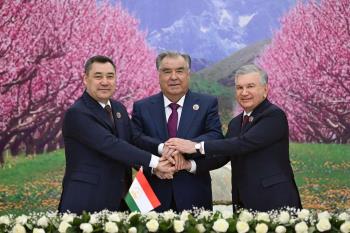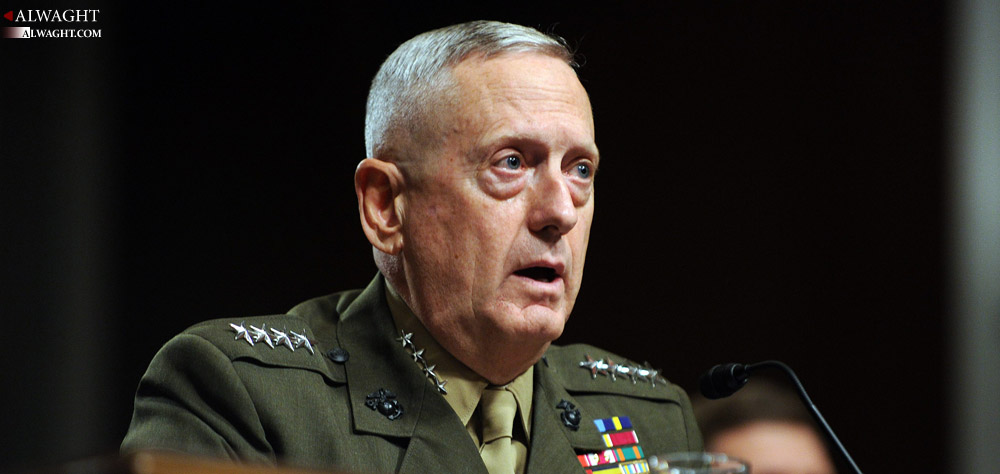Alwaght- In a very latest remarks made by President Donald Trump’s administration officials, the Secretary of Defense General James Mattis in the meeting of his NATO counterparts in Brussels made it clear that while Washington and its allies are trying to cooperate with Russia, if Russia decides to do actions in violation of the international law, the bloc has to guard against Moscow.
The Russian press on Thursday have brought in spotlight Mattis's remarks with such titles as “ Defense Secretary: Only can from a position of strength talk to Russia” and “Pentagon chief has highlighted the need for talking to Moscow from a strong position.”
At the same time of Mattis’s remarks, the US Deputy Secretary of Defense Spokesperson Lt. Cmdr. Courtney Hillson said in a statement that Washington strongly supports "building the capacity of Ukraine's forces."
Moskovskij Komsomolets, a Moscow-based daily wrote on Thursday that the US Deputy Secretary of Defense Bob Work reaffirmed the American support for the Ukraine’s army, the country’s sovereignty, independence, and the government. Work added that Washington will continue its backing for Kiev.
The reference of this Pentagon official was to the Crimea Peninsula that following outbreak of crisis in Ukraine held its general referendum and voted in favor of separation from Ukraine and reunion with Russia. The new American President Trump has called for return of the region to Ukraine, but he faced an instant and negative Moscow response.
Sean Spicer, the White House spokesman, said on Wednesday that President Trump made it clear to the Russians that he expected Moscow help de-escalate tensions in Ukraine and also return Crimea Peninsula.
Moscow was fast to react to these White House stances. The Russian foreign ministry’s spokeswoman announced that Russia will not hand back control of Crimea to Ukraine. Maria Zakharova strongly spurned the new US president’s viewpoint about Ukraine’s right to take back control of the peninsula.
“We don't give our territory to any country and Crimea Peninsula will remain part of the Russian Federation,” Zakharova continued.
Earlier, Nikki Haley, the US ambassador to the United Nations had said: “we want to better our relations with Russia. However, the dire situation in eastern Ukraine is the one that demands clear and strong condemnation of the Russian actions.”
“Crimea is a part of Ukraine. Our Crimea-related sanctions remain in place until Russia returns control of the peninsula to Ukraine,” Haley said, addressing the session of the Security Council on Thursday.
The new American administration’s anti-Russian standings especially in relation to Ukraine are coming while Trump during his election campaign kept the options open about reviewing the US position about Crimea integration by Russia and lifting of sanctions put on Moscow following Ukrainian conflict. However, after ascension to power, he in a press conference with Prime Minister Theresa May of Britain in Washington said that it was too early to open a debate on Russian sanctions relief.
On the other side, these Washington’s positions are just against pledges earlier made by Carter Page, a top foreign policy advisor to Trump, who before inauguration of Trump’s administration in a Moscow meeting said that Washington will adopt different policies on Crimea from the Obama administration.
The senior foreign policy advisor in his trip to Moscow maintained that after former President Barack Obama’s administration, the American policy will change by Trump’s government in dealing with Russia as well as the Ukrainian crisis.
Talking to Rossiya Segodnya news agency, Page said that it was possible for Washington to rid of mistaken information about the Crimea issue and that it could change policy to approve of integration of the peninsula into Russia.
The anti-Russian American politics that were aggressively followed during the second four years of Obama administration along with the European Union prompted sanctions on Moscow and at the same time led to almost a full stop of NATO-Russia Council's work and suspension of Russian membership in G8 group, a bloc made up of a gathering of the world’s eight strongest economies.
The major sticking point between Moscow and the West has been integration of Crimea Peninsula in the Black Sea by Moscow in 2014.
An area of 25,500 square kilometers, Crimea Peninsula is home to a 2.4 million population, including 1.45 million Russians, 576,000 Ukrainians, and 245,000 Tatars. The peninsula was originally Russian and was rewarded in 1954 by Nikita Khrushchev, the former Soviet Union's leader, to his home country Ukraine following a set of territorial changes.



























